Juventud Rebelde 221
Leonardo Padura’s Havana Tetrology

Havana Tetrology, or, the Urgent Need to Read Padura
As part of the 29th edition of the Book Fair, Cuban writer Leonardo Padura’s Past Perfect and Winds of Lent were presented. Afterwards, Ediciones Unión will publish a second volume with Máscaras y Paisaje de otoño
Published: Friday 14 February 2020 | 12:36:15 pm.
 By Dailene Dovale de la Cruz digital@juventudrebelde.cu
By Dailene Dovale de la Cruz digital@juventudrebelde.cu
Translated and edited by Walter Lippmann for CubaNews.

Cuban writer Leonardo Padura. Author: RTVE Published: 21/09/2017 | 06:11 pm
I woke up today with a book in my hands. I read it when I wake up, while I have breakfast, in the bathroom, before getting dressed, when I walk, inside the bus -sweaty and stress- in the Faculty… I lined it with an old magazine to take care of it among so many adventures. He’s my first literary love at this Book Fair.
It was Sunday, February 9, 2020. I had arrived at the entrance of Morro Cabaña. A friend of mine – curly hair, a skinny, ungainly body – greeted me. That day they were presenting Padura’s book, and I suddenly found a direction for my absent-minded steps.
The Alejo Carpentier room received passionate readers, who arrived hours before the meeting, sat down, lined up in a very long queue to buy the book, waited, got excited. Leonardo Padura presented the first two parts of Tetralogía de La Habana: Pasado Perfecto and Vientos de Cuaresma. Later, Ediciones Unión will publish a second volume with Masks and Autumn Landscape.
What is the Count up to, people ask him in the street. Your Mario Conde has transcended printed paper and is no longer yours, or perhaps he never was at all. For Francisco López Sacha this is the Cuban character of the 20th century, just as Cecilia Valdés was in the 19th century.
Leonardo Padura looked confident, proud of his work and of Conde in particular. The afternoon passed peacefully. And the space, small and warm, was full but in total silence. They listened.
Padura spoke of his need to narrate so as not to go crazy in the early 1990s and how his favorite reader is the Cuban public, the one he thinks about while writing in his native Mantilla.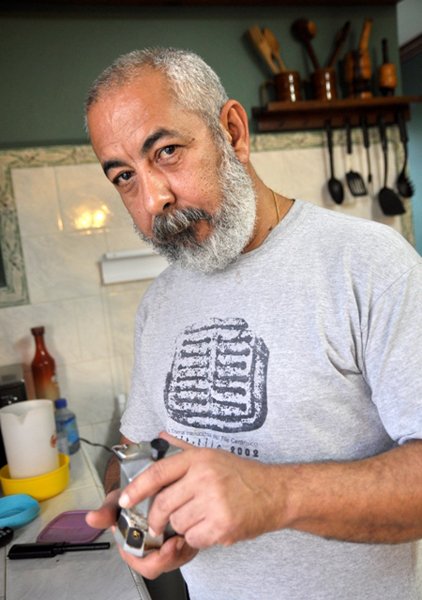
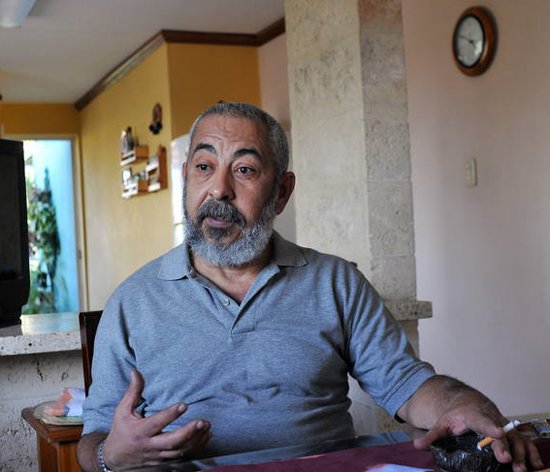
After the immense queue, of passing and paying – “one book per person”-, of receiving with emotion the dedication, the individual is left in front of the work. Why do so many people follow and adore Mario Conde and Padura? That could be the first classic question.
Padura’s novels burst onto the literary scene, to change some fixed judgments especially regarding the crime novel. They are very Cuban novels, in the author’s own words, without imitating some somewhat predictable patterns that characterized part of the detective novel published in the country during the 1970s (with its exceptions).
See here this Timeline (Scroll down for slide show)
http://www.juventudrebelde.cu/cultura/2020-02-14/tetralogia-de-la-habana-o-la-necesidad-imperiosa-de-leer-a-padura
In Past Perfect, for example, the “hero” accumulates defects, vices, incurs a compartment that we could call immoral or that borders on such classification. Nevertheless, it is he who gets up to work – even after a drunken, haggard and exhausted bout. It is he who feels and loves his city, with all its defects… On the obverse side, there are the unpolluted, perfect and false. On them, after the typical characterization (an impeccable man), little dirty rags begin to fall (which in the end are a whole dump).
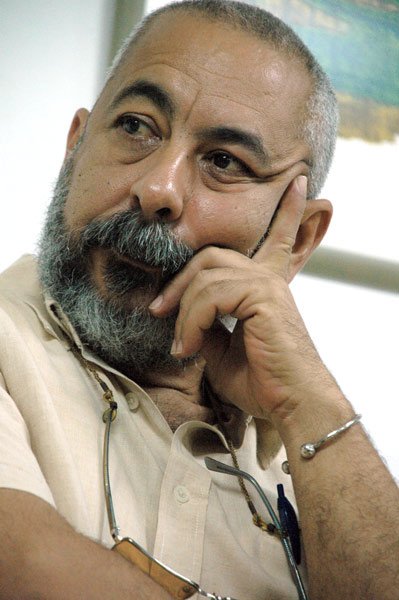
These novels are social criticism, still valid and necessary. The kind of book that catches you on a Sunday afternoon, and accompanies you during your breakfast/lunchtime meals, when you wake up or after you go to sleep. All that remains is to invite you to let yourself be caught. Conde, a little bit disheveled, will teach you the well-known phrase about deceptive appearances and will make you reflect a little bit on Cuba, Havana and how each one assumes and builds life, in the middle of their circumstances.
Between You and I, Can There be Another?
Between You and I, Can There be Another?
With the social opening to the free development of sexuality, the existence of new love and relationships between couples is normal and is practiced nowadays
By Leyla M. Mancebo Bada, journalism student
digital@juventudrebelde.cu
Translated and edited by Walter Lippmann for CubaNews.

Open relationships are one of the many examples of love and relationships between couples practiced today Author: Taken from the Internet Published: 13/02/2020 | 07:25 pm
Isabel and Pedro have been dating for almost a year and say they are very much in love. They both showed up at a party, liked each other and then gradually got to know each other better. However, they do not have the traditional relationship of a couple, they “according to the current times and new trends of love”, as they defined it, they have an open relationship.
Yes, open. It is a relationship in which both can meet other people and its members have the freedom to have sexual or affective relationships with third parties, this without including their partner in them and respecting that the greatest source of affection and commitment is maintained in the closed bond of the couple.
They tell us that they are satisfied with their relationship, “there are no complaints, sometimes a little jealousy appears but it soon passes, and the best thing is the freedom to enjoy and live – in a safe and clear way – our spaces, they add. None of this means that there are less moments that we share together as a couple, on the contrary, explains Isabel.
And it is as the Spanish therapist Antonio Bolinches says, in an open relationship, both members agree that they can have other short or lasting relationships. But it is the primary couple that structures their affective life, and where love resides with a capital letter.
“Today there are many open couples,” explains Pedro. We young people experience a lot, and that lack of commitment is more interesting, it gives you more assurance that you won’t be hurt. Who knows, and one day we will no longer want to follow this trend and we will become official in the most traditional way, but in the meantime, we feel good about it”.
[To expand on the topic, listen to the Podcast: Open Couples, Does Love Die?], where JR’s radio show More Than Paper addressed the phenomenon. JR PODCAST: http://www.juventudrebelde.cu/cuba/2017-02-13/jr-podcast-parejas-abiertas-muere-el-amor
Photo: Taken from the Internet
This is just one of the many examples of love and relationships that are practiced today. With the great social opening to the free development of sexuality, it is normal that new definitions and ways of exploring human identity and personality exist.
Likewise, with the arrival of iconic dates such as February 14, known as Valentine’s Day or Valentine’s Day, a whole horde of references to love in its maximum expression is unleashed in society. And I wonder if in the post-modern era we can assume that love is only a matter of two?
Both the officialisation of the LGBTIQ+ community and the emergence of new consensual forms of stable relationships have given way to terms such as polyamory or open relationship. Where monogamous canons are abandoned in order to live love fully, according to the affective needs of each individual.

Polyamory, swingers…
Another very fashionable practice in these times are swinging couples, in which the members of two couples exchange their members for a defined and pre-established time. About this, Mileyda Menéndez Dávila, editor of the Sex Sense section of this newspaper, explains that these are not irresponsible orgies or tasteless youthful discargas (which also proliferate, sadly).
“In addition to the swinging encounters, there are mostly adults with happy marriages, people willing to oxygenate their erotic life without the disparate hypocrisy of infidelity or the renunciation of love cultivated in harmonious coexistence.
“There is a whole code of good conduct in these groups, which includes everything from protection against pregnancy and STIs to the essential reserve in terms of handling private information. One of their passwords is usually inscribed in large letters in the usual meeting places: NO is NO, to make it clear that individual freedom is inviolable in any circumstance” he says.
There are also polyamorous relationships. As the word indicates, it literally refers to many loves and is conditioned by the scientific fact that monogamy is not a question of genetics or inherent in the human condition, but is the product of the historical and social evolution of interpersonal relationships.
In practice, polyamorous relationships are those in which their members have a consensual right to maintain more than one love relationship, and in many cases their members share lifestyles, homes and even assume collectively the raising of children. One of the characteristics of these relationships is the commitment of all parties involved.

Photo: Taken from the Internet
For some, choosing someone exclusively, among so many, to lead an ordinary life is contradictory, because sexual and emotional interest occurs naturally towards more than one person. There are those who say that the main obstacle to enjoying this type of relationship is jealousy, but control of it is a question of acceptance and self-esteem.
All these terms, practices, modernities, or whatever they are called, show us that each individual lives in his own way and has the right to his intellectual and emotional growth, but the openness of the ways of thinking and feeling, helps to achieve empathy with our fellow beings, even when we do not share their practices.
When it comes to love, anything that enriches us without harming others is valid. If loving a person is beautiful and pleasant, and if we also agree to do it in a safe way, then between you and me, there can be one more.
Read also:
And do young people today still fall in love?
21st Century Couples
Love Speaks Through the Ears

Love Speaks Through the Ears
Two decades ago, love was born between Irela and Hugo while they were studying at the Universidad de Oriente. Their relationship became strong despite misunderstandings and prejudices, and today it can be told “on board” of cinemas, books and confessions
 By Liudmila Peña Herrera
By Liudmila Peña Herrera
digital@juventudrebelde.cu
Translated and edited by Walter Lippmann for CubaNews.

The dark room lights up with every jump of the stage on the big screen. When that happens, even from the back chairs, you can guess the romance. She, with her rebellious curly hair; he, too, with a cascade of hair that spreads across his back.
She whispers something in his ear; he nods without moving his eyes from the big screen. There is a sui generis complicity between these two lovers who whisper so much in their seats. They seem to talk more than they see. They roll the credits, turn on the light and there she is, squeezing her left hand and avoiding him to stumble in the crowd that comes out of the Santiago de Cuba cinema.
Her name is Irela Casañas Hijuelos, she studies Sociology and is not disabled. He is Hugo González Diéguez, future psychologist, and blind due to retinitis pigmentosa as a child. They are holguineros and live the hard 90’s at the Universidad de Oriente. When they can, they escape to the cinema or to a concert at the Sala Dolores.
“At that time Almodóvar’s films were released and she always described them to me.” Hugo speaks as if he were recalling passages from a life he is grateful for. Twenty-two years have passed, his hair is no longer long, but he does not forget Irela’s words in his ear: “They were those other eyes that are needed to enjoy a good work of art”.
What I like about you
When they met, Irela was starting her first year and Hugo was in third. They shared a taste for rock and literature, had common friends and met in the Peña de los Raros.
“The first qualities that attracted me to him were the freshness of his character, his positivity, his spirit,so warlike, but at the same time so ethical, generous, that he faced life with a lot of peace and courage. That’s why I began to admire him and the friendship began to turn into love. Without any kind of prejudice, he did not limit himself to telling me that he loved me. I didn’t limit myself either and let that be born.
He listens to her every word with patience, and assures us that he fell in love with “her sensitivity, her intelligence, her joy, and also her naturalness, her desire for knowledge and life experiences. He could not see her, and yet he saw her.
Love and the physical
It wasn’t love at first sight. Logically. Hugo had never even touched her to know what she looked like, but her voice and her personality bewitched him.
“Saint-Exupéry said that the essential is invisible to the eyes; that one can only see well with the heart. For me, above all, love is sympathy, a connection between two souls who find points in common. I liked her voice very much because it was pleasant and feminine, without resorting to subterfuge to please. And it is scientifically proven that smell is very important in attraction. That, and our affinities, were fundamental”.
Fears
Irela says no, that she was never afraid, that “it is society, with its hostile views and labels, that tells you, ‘Look, there is fear. You have to know it.” But I wasn’t afraid to let the relationship flow. It was something so natural, so beautiful, that we didn’t question anything and started to grow together, to enjoy each other.
Hugo, on the other hand, was afraid. But his was not the fear of others, of the questioning of others. He was afraid of the possibility of rejection. “When you care for someone very much, as I did for her, that’s what happens. It was very important that she accepted me and felt for me what I was feeling for her.
The acceptance
Irela was always a determined young woman, free as her curls, and judicious, confident. She cared about the acceptance of her own – who wouldn’t? – but that was not what would define the future of her relationship with Hugo.
“There was a little fear in my family, but when they realized that our relationship was very serious, that I was not going to give up, they began to accept my decision. Besides, with Hugo’s character, his authenticity and his noble and positive spirit, it is impossible not to admire him.
And they admired him. Or better yet, they admire him. Hugo is as grateful as he acknowledges his parents for never having been an obstacle: “I was always independent. They saw that step of mine as another sign of my way of being, and they supported me”.
Growing up together
At home, Irela reads you the subtitled films, and describes the visual works when they go to an exhibition. They almost always hang out together, except when she goes to La Mezquita publishing house, where she works, and he enters her office as a clinical psychologist at the Pediatric Hospital.
But what unites them most – besides love – are words. They both write. Their passion for literature is another bond, another link, and it has helped them to drive each other forward.
“I dedicated my first book to Hugo; although I read since I was a child, he helped me rediscover literature and start writing”.
Irela has published two books of poetry and one of essays. Some time ago she was a literary editor at Ediciones La Luz, and her professional experience has been vital to him as well: “Because of her work, she is an implacable critic of my texts when she has to be”.
Hugo published a book of poetry and has another one in the process of being edited. He says that Irela does not praise without reason. He knows her and she inspires him: “She is my fiercest critic and, at the same time, my best muse”.
Prejudice
“Many people have asked me, ‘Are you two brothers? They do not understand how it is possible that, with my disability, I have such a beautiful and intelligent woman. They also ask me if she is blind or visually impaired; but there is no doubt that, in the eyes of society, she is more exposed because she is a woman and because she does not have the disability.
Hugo’s reflection is sharp. For Irela, it certainly seems to have been more difficult: “I have suffered harassment from unknown men who have seen me with him and said unpleasant things to me. But what struck me most, at the beginning of my return to Holguín, was that some people, supposedly very liberal because of their cultural work, said indirect phrases to me that denoted prejudice; although it is important to clarify that we have always received many more signs of friendship than of prejudice”.
Everyday life, jealousy, trust
“We try to make everyday life not just mean staying alive, but that life is beautiful, diverse. Thanks to the support of his family, we have our own house, in which we share the housework. He, for example, likes coffee because it gives him the exact amount of sugar that we both like. I sometimes go a little overboard,” Irela accepts and laughs happily.
Hugo laughs too. And both confess that they try to read, enjoy an audio-commented film, and be surrounded by friends… but together, always together, without untimely jealousy, because “they show little confidence in themselves. We are not jealous and that security protects us. For me it’s not a problem that she can watch and that I don’t notice. I know what I am worth and how important I am to her.
Irela and Hugo
They walk the Holguin streets talking, laughing, waving… They go hand in hand looking for the shadow, if there is one. They transmit serenity, and also something unusual, difficult to translate with words, which perhaps has to do with their way of understanding life.
“We enrich the routine: I practice yoga and he does the Tibetan rites. Besides literature, he loves football: he’s a Real Madrid fan,” she says, and Hugo adds other ingredients to a love recipe they have been perfecting for more than two decades:
“Irela and I have built a couple without secrets. There is trust, respect and complicity. She’s not just my wife: she’s my partner, my accomplice. We love each other, but we are also friends.
And the confession brings them back to that Santiago cinema of his youth, where she narrated the film to him in a low voice while he felt that love spoke to his ear.
Bolivia: Witch Hunt Against MAS…

Bolivia: Witch Hung Against MAS…
In addition to the disqualifications proclaimed by the Supreme Electoral Tribunal of Bolivia, there is a campaign in crescendo against the candidatures of the Movement to Socialism
Posted: Wednesday 12 February 2020 | 10:37:56 pm
 By Marina Menéndez Quintero
By Marina Menéndez Quintero
marina@juventudrebelde.cu
Translated and edited by Walter Lippmann for CubaNews.

Thousands of MAS followers proclaimed Arce and Choquehuanca in Sacaba, Cochabamba. Autor: Twitter Published: 12/02/2020 | 10:15 pm
The disqualification, on Tuesday, of 365 candidates for the seats in Congress – which will also be held in Bolivia on May 3rd – shows just the tip of a campaign against MAS that has already been launched from the violent, from the “legal”, and now muddies, as expected, the electoral panorama.
The lack of transparency and credibility will affect many. It is true that most of the candidates eliminated from the race did not belong to the Movement Towards Socialism (MAS). Most (205) are from the right-wing Front for Victory, which in October nominated Chi Hyung Chu – a Bolivian of Korean origin who, although distant from Evo Morales and coup leader Carlos Mesa, came as a surprise when he came in third place… (Let’s not forget that usurper Jeanine Añez is now also running, and has aspirations).
But the MAS has 57 people who have been disqualified. And although the impossibility of going on the ballot also extended to members of the very group that represents Añez (the Juntos alliance, with only nine ruled out). So it is obvious that the fundamental blow is against Evo’s party, which was first in the polls since the beginning of the polls and when Luis Arce had not yet been chosen as its candidate for president.
This is the political grouping that has had the greatest impact in deep Bolivia after 14 years of refoundation, and in spite of the misunderstandings of certain neglected sectors that today are allied with the oligarchy, or are victims of its manipulations the crowds that came to receive Arce and his running mate, David Choquehuanca, when they returned to Bolivia a few days ago, showed that support.
The vulgar “cut” of MAS candidates for senator and congress is being justified by the supposed absence of certain documents and other bureaucratic requirements. It’s an argument as little credible as it is scarce the confidence in a Supreme Electoral Tribunal replaced without reason by the coup plotters, and headed by a headline that was slected “by hand”.
First, they persecuted and imprisoned the best leaders of the Movement Toward Socialism; then they confronted them with false accusations, and now they are preventing them from running.
It is hard to believe that officials as lowly as those who seized power would allow a return of the MAS to the House of the People or the Palace of Quemado. In order to wipe out their management, they are dismantling the fruits of the model.
The “hunt” goes on for more. Luis Arce has been linked to an alleged embezzlement in the Indigenous Fund. It could be used to get him out of the game at the right time. All that would be needed is to make the charges official (everything about it is false!) and call him to trial, or lock him up?
Meanwhile, the campaign against Evo is spreading. Not only has he been charged with terrorism and sedition, charges sent to Interpol to circulate an arrest warrant, which that agency rejected.
The alleged request by social and popular organizations to prevent Evo from running for the Senate has become a recurring theme in the official media. The argument is that he does not meet the requirements either because “he lacks papers”. This is the same sword wielded against Arce so that he does not seek the presidency either, and against Diego Pary, the former foreign minister, so that he is not allowed to run for the upper house.
This Wednesday, the former candidate and coup leader Carlos Mesa – Evo’s contender in October and the one who proclaimed the false fraud that opened the door to the coup -, asked the Prosecutor’s Office to extend the investigation against Evo, and to include the former vice president, Alvaro Garcia Linera, and the former ministers Juan Ramon Quintana (a refugee at the Mexican Embassy), Carlos Romero and Hector Arce.
His ploy is to link them to alleged “electoral frauds” in light of the frustrated October elections.
There is everything in the vineyards of this Bolivia of falsified institutions. There may be even more if, as some fear, the worst machinations are yet to come.
Cristina Spoke About “Sincerely”

Cristina Spoke About “Sincerely” at the Havana Book Fair
Díaz-Canel joined the Argentine Vice President during the presentation of her book in Havana
By Marina Menéndez Quintero
February 8, 2020
Translated and edited by Walter Lippmann for CubaNews.
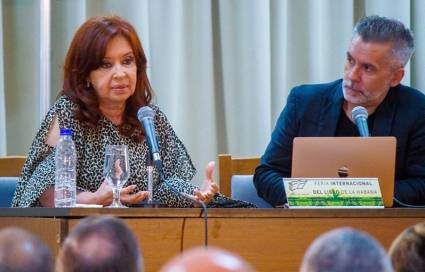
The presentation of Sincerely in Havana is the first that Cristina Fernandez has made outside of her country, and also the first in her capacity as Vice President Author: Maykel Espinosa Rodriguez Published: 08/02/2020 | 09:17 pm
A “crowd” of Argentines had been chanting for a few minutes: “Ya volvió, ya volvió” (He’s back, he’s back), among other songs, when one of Cristina Fernández’s compatriots suggested: “Uno cubano, uno cubano” (One Cuban, one Cuban). Then we heard: “Pa’ lo que sea, Cristina; pa’ lo que sea!” (Whatver you want, Cristina. Whatever you want!”)
Shortly thereafter, the former president and current vice president of Argentina burst into the crowded Nicolás Guillén hall of the Morro-Cabaña Complex, accompanied by the Cuban president, Miguel Díaz-Canel Bermúdez.
The preamble to a meeting that went beyond the mere formal presentation of a book could not be different, because Sincerely – her first volume of this type, and the one that precedes it with three others that compile speeches and texts – is much more than a strictly literary event and also constitutes, as the presenter Marcelo Figueras, an Argentine journalist, commented, a “political phenomenon”.
The text -a bestseller since its presentation in Argentina last April, welcomed with anticipatory warmth, the electoral results that would follow- was started by Cristina on the eve of the electoral transfer to Mauricio Macri, as she wanted to tell what had happened to her and to Argentina after that day.
She finished it in Cuba, where she finished writing the last chapter, started in the dining room of her house before coming to visit her daughter Florencia -sick from stress and cared for here, in March 2019-, which turned out to be, in the end, the first chapter of a book that, she clarified, is not an autobiography.
Combative as the passages that the author narrates and the greetings that she received were Cristina’s comments – although casual and often humorous – during the evening, led by colleague Marcelo with that professionalism shown when he asked the Vice President almost everything that each of the attendees would have liked to know.
In the case of the years of “Macri-ism”, they could not be left out of the book or the notes with which she explained its content, phenomena such as lawfare or the judicialization of politics, which she described as a special chapter of Latin America, but which acquired in Argentina a mafia and anti-family component, with the purpose of stigmatizing it.
It was no longer necessary to “disappear”, as the military did during the dictatorship against “dissident militants” of Latin American governments. This was replaced by media suppression through stigmatization, he explained.
In Argentina, after that dictatorship that began in 1976, a financial model came into place that indebted the country by more than ten billion dollars a year and tied it to the International Monetary Fund (IMF) until the arrival of Néstor Kirchner to the presidency, the development of an industrialization model and the payment that de-indebted the nation. For the first time Argentina, he noted, was not subject to IMF conditionality.
But with Macri came another period of indebtedness amounting to $30 billion per year, which left Argentina receiving the new administration with a debt of $44 billion to the IMF. “That was not by chance”, he said.
Cristina beieves that this should be a turning point and that the sovereign debt should be investigated, as a way to prevent the cycle from repeating itself, independently of the debt restructuring process initiated by the government of which it is part. “A point must be made. Never again,” he said.
She reaffirmed the position of the Frente de Todos and Alberto Fernández since the electoral campaign. You can’t pay if the country can’t grow economically, and you can’t grow if you don’t inject investment into the economy. The first thing we have to do to pay is to get out of the recession, he said.
Cristina Fernández gave a masterly lecture. And she gave it as she wrote: Sincerely.

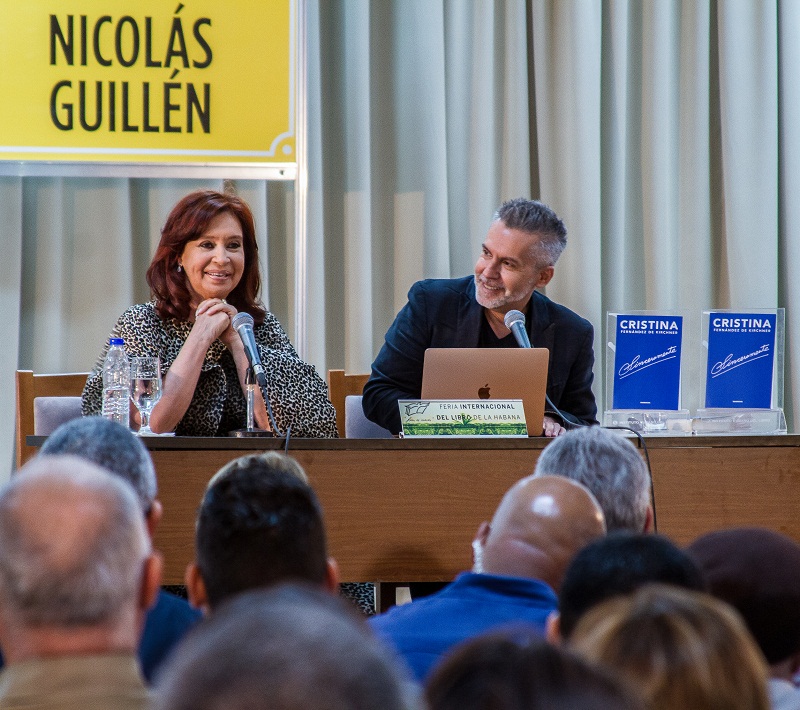
Cristina thanked the medical attention received in Cuba by her daughter Florencia, and had words of recognition for the health professionals of the Island. Photo: Maykel Espinosa Rodríguez
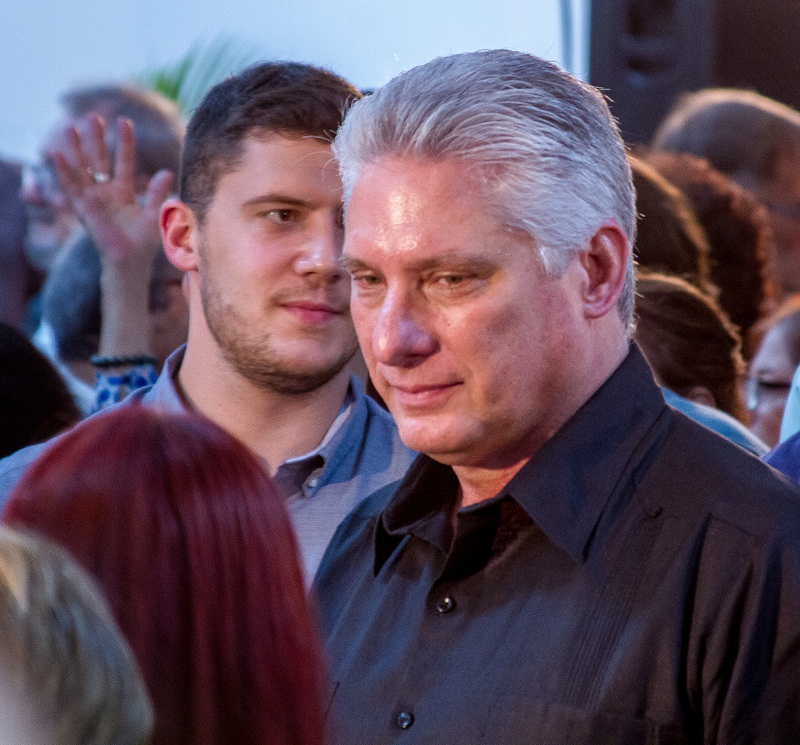
The President of Cuba, Miguel Díaz-Canel, attended the interesting evening together with intellectuals and the general public of the Island, as well as Argentinean visitors to the Fair. Photo: Maykel Espinosa Rodríguez
FULL VIDEO
Farewell Letter to a Lost Cell Phone

Farewell Letter to a Lost Cell Phone
 By Liudmila Peña Herrera digital@juventudrebelde.cu
By Liudmila Peña Herrera digital@juventudrebelde.cu
January 30, 2020
Translated and edited by Walter Lippmann for CubaNews.

Cell Phone Author: LAZ Published: 03/02/2020 | 01:23 pm
My good Samsung Note 3:
Although it sounds corny, I must say that I miss you; that everything seems boring and unimportant without you; that I will try to learn to love the Xiaomi that I will buy for myself when I get my 13th month and my uncle Alcides gets paid for the pig he sold us for the 31st there in La Caoba; that now I am going back to study for my Master’s thesis because of the books or the handwritten notes, but nothing, absolutely nothing, is the same without you: neither the HD videos I recorded with you, nor the photos, nor the 3G, nor the audio, nor the music – alas, the last records of Buena Fe and Carlos Varela went with you!—. I can’t even listen to music now, my never well-pondered Note 3. I’m crestfallen and forgetful, because not even the calendar of this little task I was lent is any use at all (nor any reminder!)
Who knows in whose hands you are! Maybe at the bottom of a drawer, hidden by the guy who put his hand in my purse in the middle of the P-12 full of people squeezed and protesting. And I was taken away by the demands of my girlfriend to look her in the face and attend to her when she began to tell me, in the middle of the bus, and to all of the other guys, another of her banal anguishes of a contemporary woman: that if the boss only listens to himself and laughs out loud at his own jokes, that if the receptionist is a gossip and applies the x-ray or ultraviolet rays to every nylon jaba [Cuban shopping bag] she enters the office with, that if she doesn’t have a balance left in the Nauta account and all that blablabla that, you and I know, was never of interest to me when you were with me.
Who would have sent me to roll up your headset around your waist and put them in your purse pocket? What feminist article would have convinced me that women are right or should be made to believe they are! Nothing, I’m keeping my talking girlfriend, but I’m getting ready for a new cell phone.
Now she says she’s got me back, that I’m finally the same person she knew at the university when neither of us knew what a mobile phone was. This was because we didn’t even have a flash memory, just five or six three-and-a-half inch discs to make the many copies of the research methodology papers we kept like a gold chain inside a pullover in a Santiago van.
It’s true that I’ve been sexually active for a week since that bastard put his hand in my purse. It’s true that I talk more and am noticed to be a little less entertaining and anxious. I have to admit that I don’t wake up anymore and the first thing I do, almost without opening my eyes, is to look for Facebook, Instagram and Twitter notifications. I don’t even have bad digestion anymore!
Oh, but how I miss you in the bathroom, especially when I sit on the toilet and do my thing calmly. Now you can call and call, and if I’m in the bathroom, I don’t answer.
And how envious I am of people who arrive at the office meeting, at the policlinic emergency room, at the bus stop – and even on the bus itself – and take out their cell phone, activate their mobile data and go surfing! And those who have no data start looking at the photos in the gallery, reading their digital books, playing games?
How hard it is for me to wait without you. I didn’t know, before my partner Robert brought you “from the outside”, after I broke that iPhone that was also in use, that you could love a Note 3 so much. It’s true that when I met you you already had miles traveled with Robert on the fast lane roads in the First World Internet, but how efficiently you always worked with me, after they changed your little piece that cost me 15 cuc in that “cell clinic”.
Now my girlfriend, who criticized me so much for my obsessive-compulsive stance towards you that she even took it out on her students at the university. She took all their cell phones and put them on the desk until after class so that they wouldn’t get distracted. Now she is now the one who walks around the house all day with her headphones stuck in her ear every Saturday while she washes or lays out her clothes.
It makes me angry every time I go to stay at her house and when we talk or watch a series, between one sentence and another, I catch her activating the data and reacting to some publication of her friends with a face of “I love you” or “I adore you”. Why lie to you: I even hate it when she says “Titi, come, open me up, let’s make a selfie” (this token doesn’t have a front camera, boy). Sometimes I see her attached to her Galaxy S10 that her uncle brought her and I think she looks like a woman attached to a cell phone. I tickle her ear and she doesn’t even notice, with that modern appendage in her hands.
Then I see it all so clearly: I hate both my girlfriend and her cell phone. She doesn’t even listen to me anymore. I look like a monkey talking to itself. Oh, my Note 3, I can’t wait for my girlfriend’s phone to be stolen!
Desperately,
The owner of the “tarequito”. [old clunker, wl]
Five Free Alternatives to Microsoft Office

Five Free Alternatives to Microsoft Office
Although the office suite par excellence that everyone knows is the one developed by the creators of Windows, there are others with similar characteristics that are free to use
By Yurisander Guevara
January 29, 2020
Translated and edited by Walter Lippmann for CubaNews.


We started with a delivery that was born in China and has been consolidated as one of the best in its field. WPS Office is, in a way, “a clone” of Microsoft Office. Not only is it similar in design, but it also has its own functionalities. This does not mean something pejorative, on the contrary, it reinforces the idea of how well Microsoft has done in this section to inspire others to follow in its footsteps.
WPS Office is multi-system. It has versions for Windows, MacOS, GNU/Linux, Android and iOS. Originally known as Kingsoft Office, this program supports all Microsoft formats. And while it has now gained more notoriety, what many do not know is that this product has been available since 1989.
Among its main applications are Writer, the word processor; Spreadsheets for spreadsheets, and Presentations for slides. It does not have software for database management, mathematical formula manipulation or vector graphics. However, in an office suite the most used are the options already mentioned.
WPS Office has a premium or paid version, which allows you to convert documents to PDF format, as well as manage documents in multiple platforms from the user account, among other benefits. This software can be downloaded at www.wps.com.
LibreOffice

Born in September 2010, and since then, with the support of the community of users of free technologies, LibreOffice has grown into a solid and full-featured product, managed by the non-profit organization The Document Foundation.
Its creation is due to a bifurcation of another office software: OpenOffice. Among its applications are Writer (word processing); Calc (spreadsheets); Impress (slides); Math (creating and editing mathematical formulas); Draw (vector graphics editor), and Base (database management similar to Access).
LibreOffice is a fairly complete solution that can cover the needs of more than 90 percent of the users. As standard it uses its own document format, .odf, but it also supports the latest and even the oldest Microsoft formats, such as .docx or .doc.
This software is available for Linux, Windows and Mac. On GNU/Linux systems it almost always comes standard with the installation. To download it you can visit en.libreoffice.org.
OpenOffice

Although its current name is Apache OpenOffice, this office suite is known to everyone as OpenOffice. It is an open-source project born in 2000 as a result of the release of the StarOffice source code by Sun Microsystems, according to several specialized sources.
The company Oracle acquired Sun Microsystems, so OpenOffice was under its shadow until it was donated to the Apache Foundation, which since then manages the software as a project.
This software has fewer features than LibreOffice, although it is still a free alternative that provides the user with the same applications as the latter, but it does not have compatibility to export, at least as standard, to the most recent formats of the Redmond giant for office documents, according to the website My Computer Hoy.
The latest stable version of OpenOffice dates from last year and can be downloaded at www.openoffice.org.
FreeOffice

Although not updated since 2018, this office software package is quite interesting.
Developed by the German company SoftMaker, founded in 1989, FreeOffice is a free office suite based on SoftMaker Office technology (which is paid for and includes more features).
FreeOffice has as applications a word processor (TextMaker), spreadsheets (PlanMaker) and presentations (Presentations). Its software is proprietary, but its free version is available for Windows, Linux, MacOS and Android.
At www.freeoffice.com it is possible to download this suite which also offers, separately, a free PDF document editor.
Google docs

This is a software as a service that does not require installation in the case of computers, as it can be used only with a web browser, as it is in the cloud.
Google Docs is a simple and fast way -as long as the Internet is available-, to work with digital documents. It has a text editor, spreadsheets, a presentation editor and a form editor.
If used as a mobile application, it allows you to keep files offline, and in its desktop version it offers the possibility of downloading the document to your computer. However, perhaps one of its greatest features is the ability to archive text on Google Drive, which makes it ubiquitous and accessible if there is a network connection.
A downside to this type of application is that users could sacrifice their privacy if their Google Account is compromised. The Google office suite is available at docs.google.com.
As we have seen there are several alternatives to Microsoft Office, all free and available in a wide range of operating systems or even as a service. Do you want to try one?
To Protect or Not to Protect

Sexo Sentido
To Protect or Not to Protect, Where is the Love?
Published: Tuesday 28 January 2020 | 10:16:43 pm.
 By Mileyda Menéndez Dávila sentido@juventudrebelde.cu
By Mileyda Menéndez Dávila sentido@juventudrebelde.cu
and Arianna Ramos Martín digital@juventudrebelde.cu
Translated and edited by Walter Lippmann for CubaNews.
When the wind’s direction cannot be changed, simply adjust the sails.
Jackson Brown

Protect Yourself Author: Juventud Rebelde Published: 28/01/2020 | 09:56 pm
The origin of the word condom is still unknown. One of the assumptions is that it bears the name of its inventor, Mr. Condom or Contón. Even more curious is that the advantages of this object, for which demand dates back to ancient Egypt, are still unnoticed by some young people, as archaeological evidence shows.
We spoke with students from various technology schools and from the University of Havana about this issue. Not a few said they felt more pleasure in sexual relations without a condom (even though they knew the risks of not protecting themselves). This is because “these devices reduce skin-to-skin contact. Others see it as a deterrent to arousal or are upset by the delay in putting it on at the crucial moment, so they prefer to “take a chance”, and hope that the girl is healthy and keeping track of her ovulation.
In the survey, the girls were more concerned about the issue of protection and listed short- and long-term risks, but even this anxiety does not make them buy condoms or carry them in their bags and backpacks.
“I feel very sorry for them,” one of them said with a mischievous laugh, and if it’s worrying that at this point they are ashamed because other people know that they are sexually active, much worse is that they leave the responsibility for their sexual health to their partners alone.
Of good intentions…
One of the students interviewed said she had a boyfriend for almost a year, a steady partner with whom she never had sex without a condom – allegedly. One day the boy took it off in the middle of sex without her noticing, and then she was embarrassed to talk about her lack of control, so it was doubly irresponsible.
Weeks later, she didn’t see her period and started to worry, because she used to have it every month without fail. Then she went to the doctor she found out about the unexpected pregnancy. Then the boyfriend decided to confess, but it was too late to apologize and they had to face an abortion that who knows what consequences it will bring in the long run for the girl?
“It could have been worse,” reflected other young women when we discussed the case. If the boyfriend had acquired a sexually transmitted infection (STI) in previous relationships, he would have given her one too.
This awareness of the importance of protecting yourself in all sexual relationships is the kind of life-changing decision you make, other students said.
But if you are not consistent or do not incorporate creative ways of proposing and placing it, if you think that it takes the fun out of the moment and you cling to thinking badly of it, if you hide behind the fact that it is hard to acquire because of a shortage in the market, and you do not worry about managing it, like other scarce products, it can also have a bad effect on your erotic performance, they acknowledged.
It is not the very thin latex film that interferes with the body’s sensations, but the concern, the lack of concentration to perceive stimuli. The proof is that when a person likes you and rubs your genitals over clothes (much thicker than a condom), they react perfectly.
Responsible alternatives
Of the students surveyed, almost none knew about the alternative of the female condom (which is not available on the national market) or believed that it could be used with a male condom at the same time, which is nonsense because that friction can cause one of them to break.
As for the brands already registered in Cuba, Vigor and Momentos, all agreed in mentioning the first one as their favorite because the product is stronger and better lubricated. Alas, they cannot choose because both brands are in short supply in pharmacies and other alternative outlets, such as cafes and bars, a concern that also reaches this editorial office from other provinces.
Some fortunate people told about experiences with foreign condoms and those of the Climax brand (which are currently delivered in their prevention actions by Prosalud volunteers), designed to increase pleasure by incorporating irregular flavors and textures. Is it not possible to have an alternative sale of these products in the TRD, they ask?
At the end of the discussion, they acknowledged that using condoms or looking for alternatives without penetration is to think about yourself and that being you love or is next to you. You both need to trust that sex will be a healthy moment, something to remember and talk about later with a smile, not a calendar or a positive STI test in your hands.
Argentina Says “Never Again” to Foreign Debt

Argentina Says “Never Again” to Foreign Debt
That seems to be the feeling when the government takes a defining step: restructuring the debt burden that binds it to the IMF and private creditors
Published: Saturday 01 February 2020 | 08:58:50 pm.
By Marina Menéndez Quintero
Translated and edited by Walter Lippmann for CubaNews.
 With the certainty that reason instills, the new Argentine government has already stood on its feet and is preparing to take the first and most important step of the beginning of its term, from which everything can be defined.
With the certainty that reason instills, the new Argentine government has already stood on its feet and is preparing to take the first and most important step of the beginning of its term, from which everything can be defined.
The renegotiation of the foreign debt in which Mauricio Macri’s government was trapped is essential to achieve the goals that the Frente de Todos wants to achieve in Argentina.
The urgency is understood in a simple way, and not only because the term will last only four years. It is not possible to walk around while a bundle of more than 280 billion dollars owed to private holders and the International Monetary Fund (IMF) is being dragged along. This is not only because the bundle of bills weighs too much: if each disbursement is not made within the established time frame, the country would be declared in default -that is, in cessation of payment- and then the world would indeed cut off the Argentines’ water and electricity.
The official start to get “relief” has been the first meeting of the young Minister of Economy, Martín Guzmán, with the private creditors; a meeting that took place this week at the Council of America in New York, and from which not all the businessmen came out very happy, according to certain sources that, perhaps, want to see things only from the dark side.
The headline, said the complainants, did not provide details of the “offer” to renegotiate, let alone the fiscal plan to be implemented by the Argentine government. Do businessmen have to control what the executive will do?
In any case, Guzmán had already given the details before leaving for the meeting. They are the same ones that President Alberto Fernández announced when he was still a candidate.
At that time, the president warned that, from now on, he would not borrow another dollar. And that, before paying, the first thing would be to resume growth.
At this point, it is clear that what Argentina is seeking is to “re-profile” the payment schedule, a term used to replace the familiar word “renegotiation,” and that it has different conceptual nuances because the nation does not aspire to “quitas,” that is, to a reduction in the nominal value of debts. What is sought is a restructuring -another current definition- that allows for the postponement of maturity dates.
The position is one of unquestionable technical reasoning: how to pay if the country does not produce, perhaps by asking for more debt, as Mauricio Macri did?
But Fernandez’s path, which Guzman follows, also carries with it a sense of national sovereignty that cannot be ignored if the economy and the country are to be brought to fruition.
“The economic program was designed and executed by us (…) What is ours is ours,” said Martín Guzmán before leaving for the United States, when asked about the expected negotiations with the Fund.
The security with which the holder conducts himself is not surprising. First, because it has been the international financial institution’s conditioning – in exchange for the credits granted to Macri – that has caused things to be the way they are again: unemployment triggered by state layoffs and the bankruptcy of small and medium-sized companies, a slowed-down economy, less purchasing power that made food shortages and in some cases hunger resurface, pension cuts, job insecurity, rising gas and electricity prices, and a long list of other similar things everywhere this neo-liberalism is applied in blood and fire.
Secondly, because Guzmán is not an upstart. He has worked for several years alongside the Nobel Prize winner in economics, Joseph Stiglitz, and has become an expert precisely on the issues surrounding sovereign debt.
“He is the right man at the right time (…) A brilliant and knowledgeable economist who can combine youthful vigor with experience beyond his 37 years,” Stiglitz said at the time.
On the other hand, prestigious economists who look at things from a more political angle and located in the Third World, such as the Belgian Eric Toussaint, say that Alberto Fernandez’s executive has all the arguments not to pay, because the Fund violated its own technical requirements by negotiating with Mauricio Macri the delivery of the largest credit that the institution has ever approved ($ 57 billion), even knowing that, even then, Argentina had no possibility of paying it back.
Some consider that the IMF followed Donald Trump’s instructions to support Macri; but others consider that the purpose was to tie Argentina back to the International Monetary Fund, as it was from the mid-1980s until the recovery achieved with Néstor Kirchner as of 2003, after the renegotiation of the debt at that time and the break with the dictates of the IMF. This would make the country “more manageable”.
Now some fear the interests and influence that Trump could have on the attitudes that the Monetary Fund adopts when negotiations are opened.
Many concerned people
Although it was routine, this week’s meeting in New York had nuances of urgency. The first debt repayments to the private sector are knocking on the doors, and the country’s coffers are empty.
In spite of the premiere flavor of the meeting with 50 bondholders who represented, according to what happened, 40 percent of all private creditors, there were already other meetings, especially with the IMF.
The Fund disbursed and now does not lose any footprint to the country. As soon as the primary elections (PASO) showed the possibility of a Peronist triumph in October, its officials went to sound out the ground and meet with Fernández.
More recently, the president himself spoke with the new head of the institution, the Bulgarian Kristalina Georgieva; and then the Minister of Economy who, it seems, left the interview with more satisfaction than regret, in accordance with his belief that the IMF “has changed”.
Now Martin has just met with two of its top officials, and will return to the dialogue with Georgieva in February. Both of them are protected by the good wishes of Pope Francis, because the meeting will take place during the presence of both of them in the Vatican.
What follows will not be easy. Argentina aspires to postpone the payment terms without taking away – as is required, moreover, by a loan as large as the one Macri squandered – but, according to the monitary fund manuals, to grant this postponement, the nation would have to assume commitments… And Buenos Aires insists that there will be no more recipes.
“We are not going to allow any conditionality,” said the head of Economy.
A united front
Perhaps one of the best things about the Argentine position is the unitary way in which it is forged and sustained.
Four days ago, in an unprecedented debate, the Chamber of Deputies approved almost unanimously, even with the backing of the legislators of the now-opposition Juntos por el Cambio, a bill that empowers the executive to renegotiate the debt in dollars with foreign private creditors.
It is expected to become law when the Senate debates it next week and, although the text limits the government to setting the terms of the negotiation, the strong support it received from 224 votes to two with one abstention also gives strong moral credit (and not just official authorization) for the government to act.
In any case, nothing seems to have been left “to the good Lord”. While with the private ones the executive is left free to act, it will go as a team to the negotiations with the International Monetary Fund. A team will accompany Guzmán in the preparation of the proposals for this procedure: the most difficult.
The new body is called the Unit for Technical Relations with the IMF. Its mission will be to assist the Economy Minister in the “formulation and execution of the strategy” of these links and, according to the Argentine press, the one who formulates the proposals.
There seems to be a growing consensus on the perniciousness of loans and debts, judging by the loud applause that followed the intervention of Maximo Kirchner Fernandez, head of the Frente de Todos party in the Chamber of Deputies, during the discussion of the law passed there this week.
“What we have to say here is “never again” to the foreign debt, and to start elaborating, among all of us, an economic policy that will eliminate, from now on, this kind of problem of the Argentine society”.
This is the second time in that nation that such a challenge is faced. And the bidding has just begun.
Lung Cancer: Cuba’s Leading Cause of Death

Lung Cancer: Cuba’s Leading Cause of Death
As of February 4, World Cancer Day, until March 21, when a national race will be held in favor of this struggle. The World Day against Cancer will take place in Cuba to encourage self-care and self-responsibility.
By Ana María Domínguez Cruz anamaria@juventudrebelde.cu
Published: Thursday 30 January 2020 | 12:39:43 pm.
Translated and edited by Walter Lippmann for CubaNews.

Two out of ten deaths worldwide are caused by tobacco. Author: Falco Published: 21/09/2017 | 05:49 pm
Lung cancer is the leading cause of death in Cuba for women and men, according to recent statistics registered by the Ministry of Public Health (Minsap). This shows the need to be aware, first of all, of the increase in dependence on smoking, the main risk factor for this disease.
This reflection was shared by Dr. Maria Caridad Rubio Hernandez, head of the Independent Section for the control of cancer in Minsap, who warned that the age of initiation in this habit is increasingly younger and the number of women has increased in recent years.
It is important to work on raising public awareness of this type of cancer, because, although we have the Cuban vaccine against lung cancer (CIMAvax-EGF), thanks to the work of scientists at the Center for Molecular Immunology, it is for a specific treatment, not for all types of lung cancer. It is vital to respect the non-smoking areas in public establishments and to address the impact of second-hand smoke, among other actions.
The oncology specialist revealed that in 2019, 48,617 new cases were recorded, and 24,912 people died during that period, with the provinces of Artemisa, Mayabeque, Las Tunas, Granma and Santiago de Cuba recording the highest number of deaths from this type of disease.
We aspire to position cancer as a chronic controlled disease, the official stressed, but to do so we need the responsible behavior of the population and intense educational work.
“Unfortunately, there are non-modifiable risk factors for cancer, such as age and heredity, but self-care and self-responsibility are essential for early diagnosis and timely treatment. This is the case, for example, with breast and cervical cancer, for which the female population does not always understand the urgency of learning to perform breast self-examination or the need to go for cytological testing.
Access to cancer diagnosis and treatment is organized based on the strategy developed by Minsap at the national level, said Rubio,. He mentioned 42 medical oncology services in all the country’s hospitals, the two third-level institutions such as the National Oncology Institute and the Hermanos Ameijeiras Hospital. In addition, there’s the upcoming incorporation of Cimeq for comprehensive cancer diagnosis, 25 nuclear medicine services, nine radiotherapy services and nine oncopediatrics services as the main access routes.
“Cancer is one of the priorities of our health system and cases of pediatric cancer are becoming more relevant and urgent in the care system. As a result, central nervous system tumors, leukemias and lymphomas being found more frequently in infants.
Rubio pointed out that, in the midst of the hostile context that conditions the blockade imposed on the country, Cuba consolidates the introduction of new technologies for the diagnosis and treatment of this pathology, whose cost is very high.
“Increasingly, personalized medicine is being advocated, which makes care processes more expensive, but it is part of the interest of out health system to maintain a high life expectancy in our population, and with quality”.
Subscribe to Blog via Email
| M | T | W | T | F | S | S |
|---|---|---|---|---|---|---|
| 1 | ||||||
| 2 | 3 | 4 | 5 | 6 | 7 | 8 |
| 9 | 10 | 11 | 12 | 13 | 14 | 15 |
| 16 | 17 | 18 | 19 | 20 | 21 | 22 |
| 23 | 24 | 25 | 26 | 27 | 28 | |

You must be logged in to post a comment.